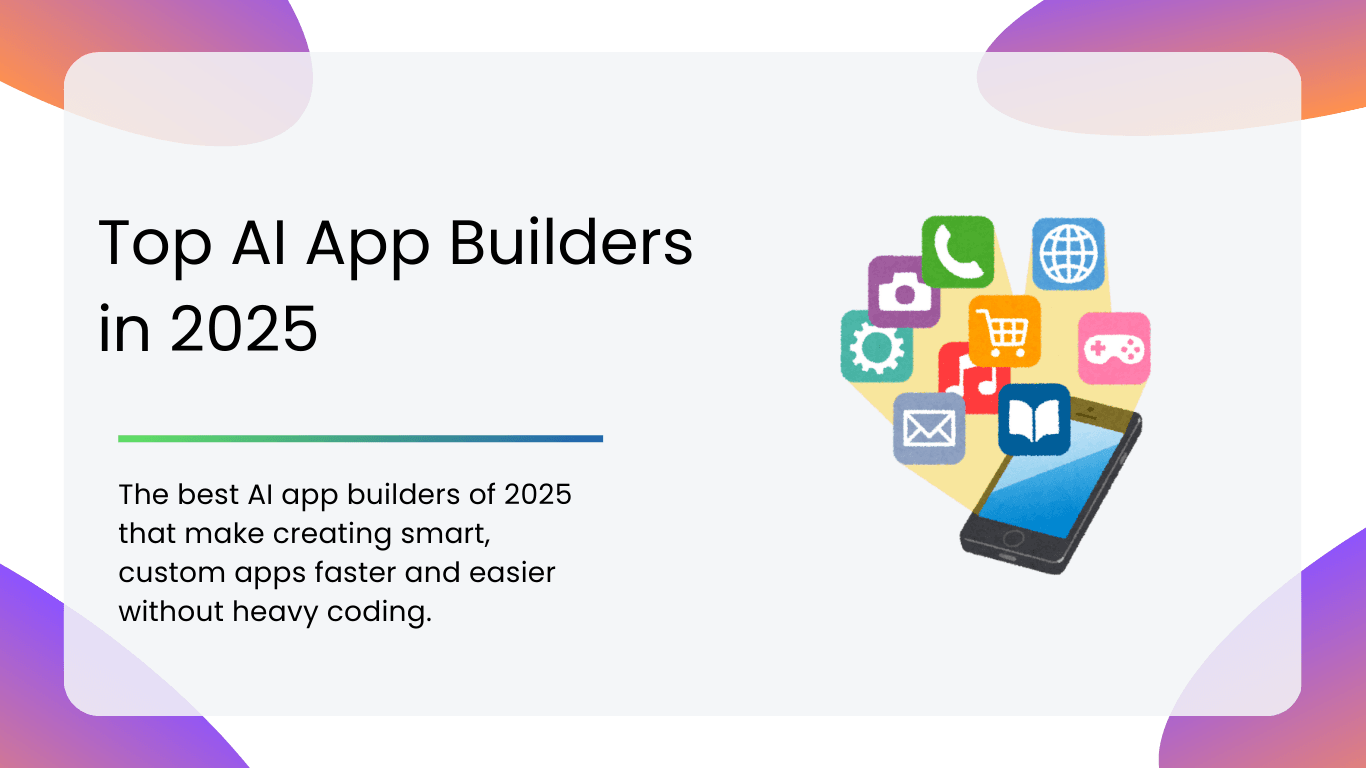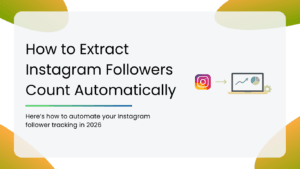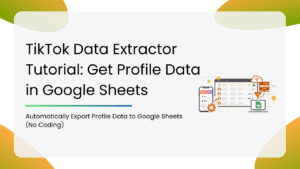App building is evolving faster than ever, and 2025 marks a new chapter where AI takes the center stage.
Today, creating an app is no longer just about writing lines of code that take days to complete. Instead, smart AI tools help turn ideas into reality by guiding design, suggesting features, and automating repetitive tasks. This shift means that anyone can bring app ideas to life more quickly and with less frustration.
In this blog, we’ll dive into the AI app builders that are shaping this exciting future. You’ll see what makes each one stand out, how they can help you build better apps, and what to watch out for along the way.
If you’re someone who wants to work smarter and build faster, this guide is the place to start your journey.
What Does an AI App Builder Do?
An AI app builder is like having a smart assistant by your side while you create an app. Instead of doing everything manually, these tools use artificial intelligence to speed up the process and make your work easier.
They can take your simple instructions or prompts and turn them into code, help design user-friendly layouts, suggest improvements, or even fix bugs before they become a problem for you.
Beyond just writing code, these AI app builders often guide users through workflows, connect apps to other services, and help automate repetitive tasks that usually take hours to complete. This means you spend less time wrestling with technical details and more time focusing on bringing your ideas to life.
Key Features to Look for in an AI App Builder
- Plain Language Coding: The platform should let you describe your ideas in simple language and then turn them into working code with minimal effort.
- Visual Design Tools: Look for an easy drag-and-drop builder that lets you shape your app’s layout and style without needing to write any code.
- Workflow Automation: Good AI app builders can handle repetitive tasks and set up automatic processes. They should make your work much smoother.
- Easy Integrations: Connecting with tools like payment systems, analytics, or databases should be straightforward, so that your app can do more but with less setup.
Best AI App Builders at a Glance
| Name | Best For | Type | AI Features |
| Replit AI | Collaborative coding and rapid prototyping | Coding platform | Natural language to code, multi-file context, smart suggestions, AI chat |
| Firebase Studio | Scalable backends and real-time apps | Backend platform | Real-time data sync, automated security, analytics, and cloud functions |
| Lovable | Fast, design-first app creation | No-code builder | Drag-and-drop design, smart templates, built-in engagement tools |
| Bubble | Advanced web apps, complex workflows | No-code platform | Visual editor, automated workflows, code suggestions, plugin AI |
| Bolt.new | Simple web apps, quick prototyping | No-code builder | Pre-built blocks, collaborative tools, instant setup |
| Softr | Building from Airtable data | No-code builder | Airtable integration, template AI, membership logic |
| Glide | Apps from spreadsheets, internal tools | No-code builder | Spreadsheet-to-app, component suggestions, visual builder |
| Create.xyz | Quick web app and website design | No-code builder | Drag-and-drop editor, responsive templates, integration helpers |
| Adalo | Powerful mobile and web apps | No-code platform | Visual logic, workflow automation, AI-driven notifications |
| AppSheet (Google) | Custom business process automation | No-code/data platform | Data-to-app AI, workflow automation, security suggestions |
Table of Contents
| 1. Firebase Studio |
| 2. Lovable |
| 3. Bubble |
| 4. Replit AI |
| 5. Bolt.new |
| 6. Softr |
| 7. Glide |
| 8. Create.xyz |
| 9. Adalo |
| 10. AppSheet |
Best AI App Builders in 2025
1. Firebase Studio
Firebase Studio helps you build and manage your app’s backend easily by using Google’s reliable Firebase platform. It covers everything, right from real-time databases and user authentication to hosting and cloud functions. Whether your app is small or gearing up for millions of users, Firebase Studio simplifies the entire backend setup so you can focus on building features. Its real-time syncing is perfect for apps needing fast updates, like chats or live dashboards. Plus, built-in analytics help you track performance and improve your app while it’s running.
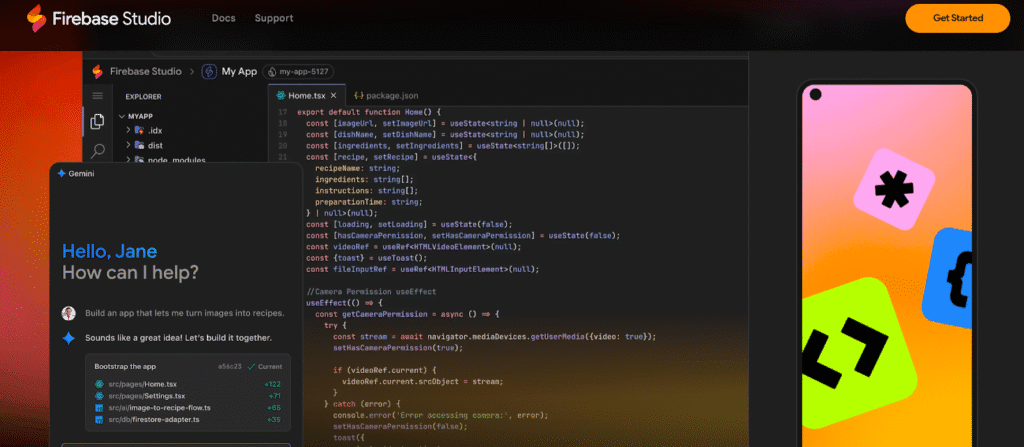
Key Features
- Easy Backend Setup: Get your databases, user authentication, and hosting up and running quickly.
- Real-Time Data Sync: Changes you make update instantly across users and all devices.
- Built-in Security: Comes with great security rules to keep your app safe.
- Integrations: Works smoothly with a bunch of popular tools and services.
- Analytics Included: Track how users interact with your app right from the start.
- Cloud Functions: Write custom back-end code that runs automatically on Firebase’s servers.
Pros
- Fast Setup: You can launch your app backend quickly without deep knowledge of any server setup.
- Scalable: Works well whether your app has 10 users or 10 million.
- Real-Time Updates: Great for apps that need live data like charts or dashboards.
Cons
- Learning Curve: Some Firebase features can be tricky for beginners.
- Pricing: Costs can grow as your app gets more users and data.
- Limited Custom Backends: Heavy customization might need external services.
2. Lovable
Lovable is made for creators who want to design beautiful and user-friendly apps without coding. Its drag-and-drop builder and ready-made templates let you launch quickly and focus on user experiences. It includes handy tools like push notifications and in-app messages to keep users engaged. Lovable also supports popular integrations for payments and analytics.
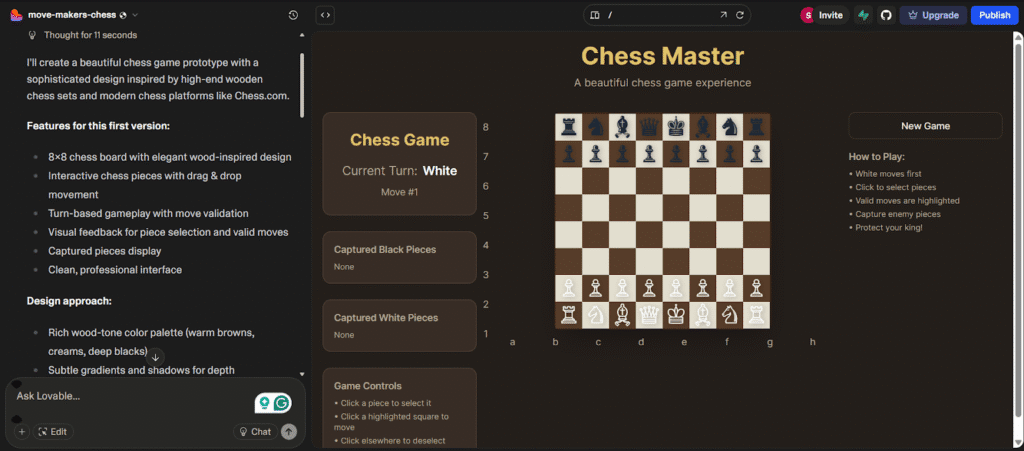
Key Features
- Drag-&-Drop Builder: Easily design your app visually without any coding knowledge.
- Pre-Built Templates: Start with ready-made designs to speed up launching.
- User Engagement Tools: Built-in options like push notifications and in-app messages.
- Integrations: Connect with popular services for payments, analytics, and more.
- User-Friendly Interface: Clean and simple design tools that anyone can use.
- Collaboration: Work together with your team right inside the platform.
Pros
- No Coding Required: Perfect for beginners or teams without deep developer skills.
- Fast Design: Create polished apps easily with templates and visual tools.
- Team Collaboration: Built-in tools make working together easier.
Cons
- Not for Complex Apps: Best suited for straightforward apps and not highly complex ones.
- Pricing: Some features might be locked behind paid plans.
3. Bubble
Bubble is a no-code platform that lets you build full-featured web apps visually. Drag and drop your app’s design, then set up workflows and database actions without any coding. It also handles user authentication and app hosting, all in one place. With a large plugin marketplace, you can add extra features into it easily. Bubble works for beginners who want no code and for pros looking to build complex apps fast.
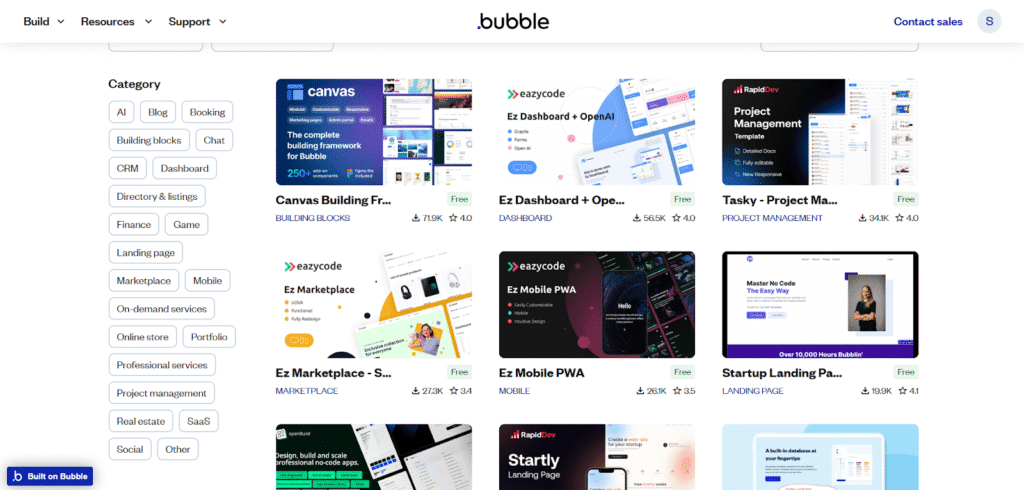
Key Features
- Visual Editor: Drag and drop elements to design your app.
- Workflow Automation: Set up complex rules and actions without coding.
- Database Management: Easily create and manage your app’s data.
- Plugin Marketplace: Add extra features by installing plugins created by the community.
- User Authentication: Built-in options for logging in and user roles.
- Hosting Included: Bubble hosts your app, so you don’t have to worry about servers.
Pros
- Highly Customizable: You can build apps with lots of advanced features.
- No Coding Needed: Everything happens visually, but with great depth for power users.
- All-in-One: Design, data, workflows, and hosting done in one place.
- Active Community: Lots of shared plugins, templates, and support.
Cons
- Steeper Learning Curve: Takes time to master advanced workflows and features.
- Performance: Can slow down with very large or complex apps.
- Pricing: Powerful features come with higher price points as usage grows.
4. Replit AI
Replit AI is all about making coding friendlier, whether you’re building your first app or working on a big project. Instead of getting stuck on tricky bits of code or flipping through endless files, you can simply tell it what you want in everyday language, and Replit’s AI will turn your words into real code. What’s nice is that it keeps track of your whole project across different files, so you don’t lose your place. As you type, it offers smart suggestions and is there to clear up any confusing code when you need a hand. Plus, you can chat with it like you’re brainstorming with a teammate, which makes building solo or collaborating with friends feel a lot smoother and much more fun.
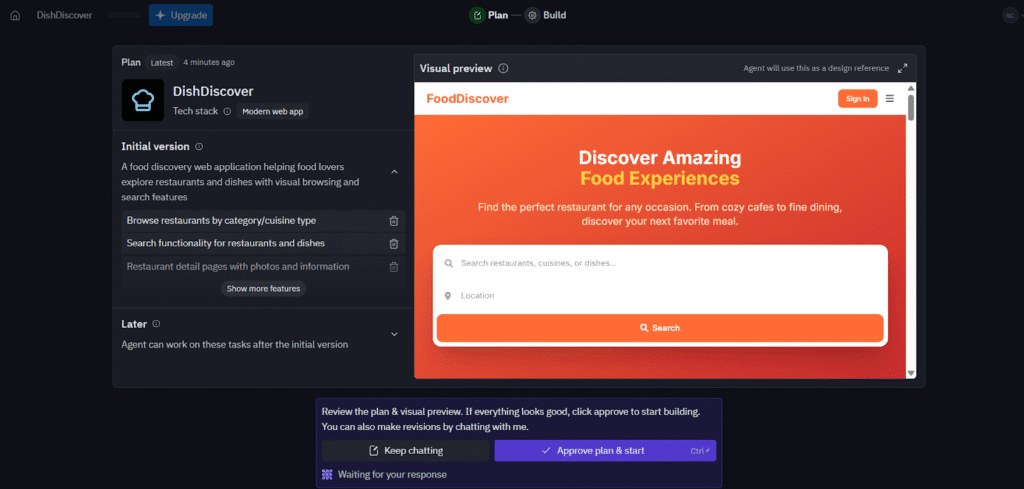
Key Features
- Natural Language to Code: You can describe what you want in plain English, and Replit AI turns it into working code quickly.
- Multi-File Context: It understands the full project, so its help fits the part of your code you’re working on.
- Collaborative AI Chat: Chat with your team and the AI to get instant feedback and make teamwork smoother.
- Clear Documentation: Replit AI explains confusing code in simple, easy-to-understand language.
- Code Generation: Just ask, and it creates code that’s easy to read and customize.
- Auto-Complete Suggestions: As you type, it offers smart hints that save time and keep your flow going.
Pros
- Easier Coding: Write code using simple language, making it faster and easier.
- Project-wide Help: Understands your whole project for smarter suggestions.
- Good for Teams: AI chat supports smooth collaboration.
- Saves Time: Auto-complete and code generation speed up your work.
Cons
- Struggles with Complex Code: May miss tricky or unique logic.
- Needs Tweaking: Generated code isn’t always perfect.
5. Bolt.new
Bolt.new is a quick and easy way to build apps with minimal effort. It’s designed to help creators jumpstart projects fast by focusing on simplicity and speed. Bolt.new lets you create basic web apps and tools without coding, therefore, it’s great for testing ideas or building simple workflows quickly. The platform keeps things straightforward, which makes it easy for anyone to bring an app to life fast.
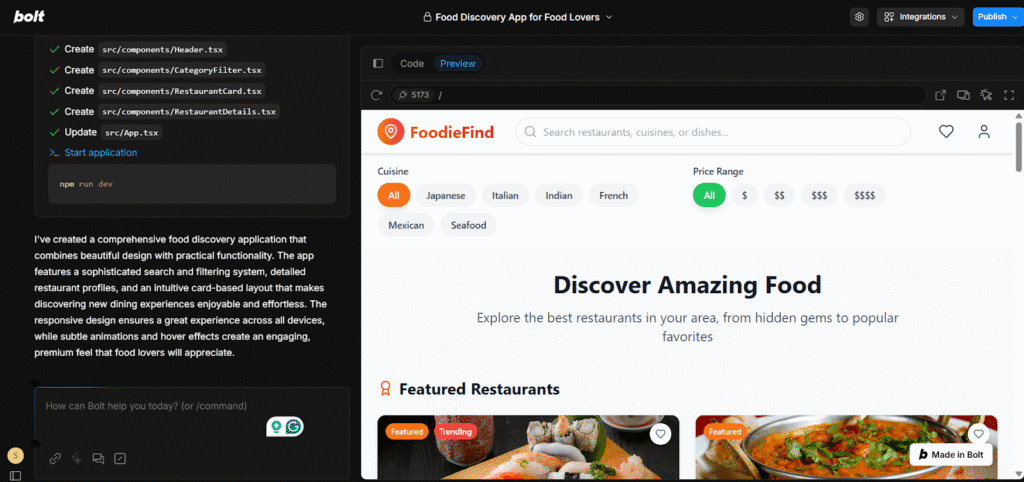
Key Features
- Quick Setup: Start building apps instantly with an easy interface.
- No-Code Environment: Create functional apps without writing code.
- Pre-Built Blocks: Use ready-made components to speed up development.
- Simple Integrations: Connect with common apps and tools easily.
- Collaborative: Work with teams on projects in real time.
Pros
- Fast & Simple: Great for quick prototypes and simple apps.
- Easy to Use: It is beginner-friendly, hence, no coding is needed.
- Collaborative Features: Makes teamwork easy and smooth.
Cons
- Limited Complexity: Not ideal for highly complex apps or features.
- Basic Customization: There are only few options for deeply customizing your app.
- Smaller Ecosystem: Fewer integrations and plugins compared to other bigger platforms.
6. Softr
Softr lets you build websites and apps on top of Airtable without any code. It’s great if you want to turn your Airtable data into a polished product fast. With Softr, you can create client portals, membership sites, internal tools, or marketplaces by using a drag-and-drop interface that requires zero coding skills. Its strength is in letting you turn your existing data into interactive and user-friendly experiences.
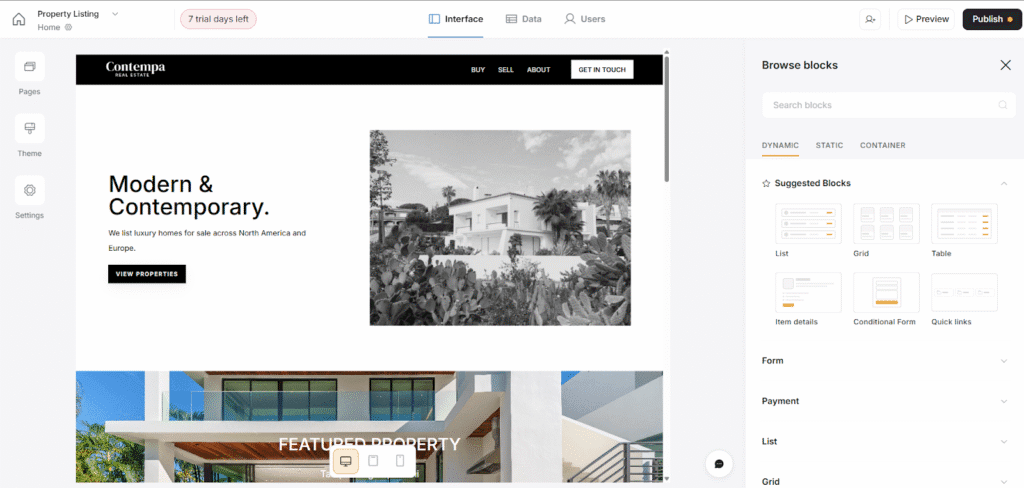
Key Features:
- Airtable Integration: Seamlessly uses your Airtable data as the app’s backend.
- Pre-designed Templates: Launch faster with ready-to-go layouts.
- User Authentication: Build member-only areas with login options.
- Customizable Design: Adjust styles and layouts to fit your brand.
- Payment Options: Supports subscriptions and one-time payments as well.
Pros:
- Turns Data into Apps Easily: Perfect if your infomation is already in Airtable.
- No Coding Needed: Design and launch without technical know-how.
- Good for Memberships: Create gated content and control access smoothly.
Cons:
- Dependant on Airtable: Limited if your data isn’t already in Airtable.
- Complex Apps Limited: Best for simpler use cases, less so far advanced apps.
7. Glide
Glide is an AI app builder that transforms spreadsheets into full-featured mobile and web apps without any coding. It’s incredibly user-friendly and lets you build apps that work across multiple devices in minutes. Perfect for those who want to create apps based on data stored in Google Sheets or Excel, it also offers a visual builder with lots of customizable components. It’s popular for internal tools, event apps, directors, and simple customer apps.
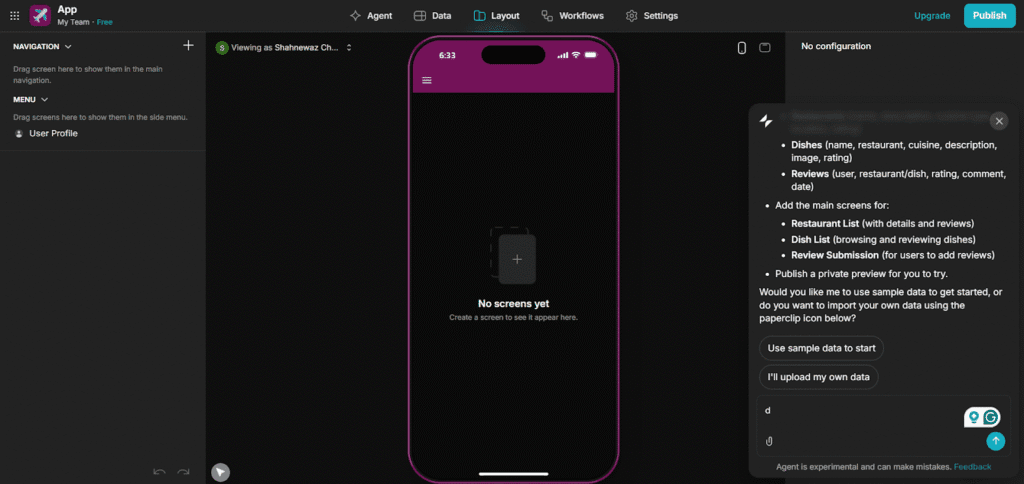
Key Features:
- Spreadsheet-Powered: Converts Google Sheets or Excel files into apps.
- Drag-and-Drop Builder: Customize layouts without any code.
- Cross-Platform: Apps work on both mobile and web seamlessly.
- Rich Platform: Includes charts, forms, maps, and many more for interactivity.
- User Profiles & Authentication: Manage app users with login options.
Pros:
- Super Easy to use: Great for quick app creation without any tech skills.
- Works Across Devices: There’s no need of building a separate app for mobile or web.
- Flexible and Visual: Customize your app closely to your needs.
Cons:
- Limited to Spreadsheet Data: Not ideal if you need complex databases.
- Scaling Challenges: Can slow down with very large or complex apps.
- Some Features Need Paid Plans: Certain advanced options come at a cost.
8. Create.xyz
Create.xyz is designed to help you build modern websites and web apps quickly, with no coding needed. It offers a sleek and user-friendly interface that is focused on creativity and speed. Whether you want to build a portfolio site, landing page, or interactive app, Create.xyz makes it simple to design and launch. It’s great for anyone who wants a polished web presence without the hassle of coding or complex setups.
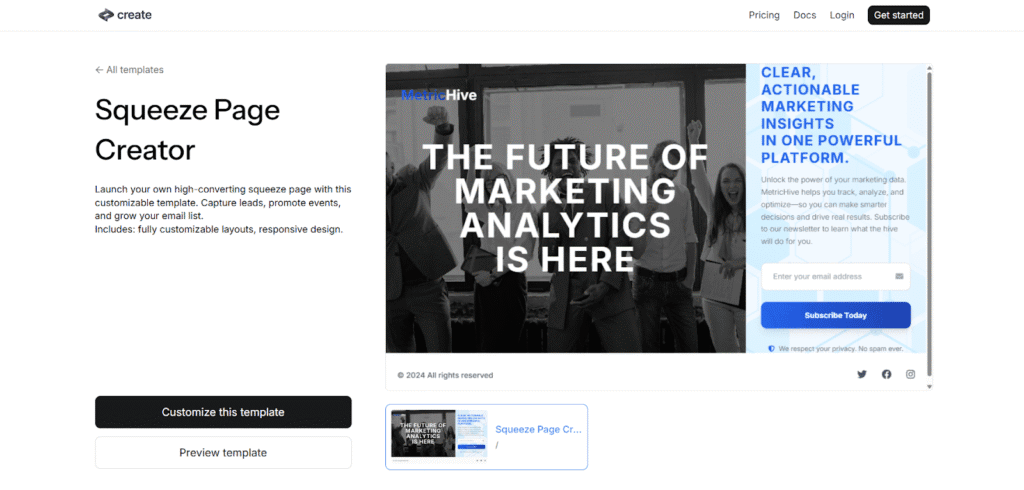
Key Features
- Drag-and-Drop Builder: Design your site or app visually with no code.
- Modern Templates: Choose from stylish and ready-to-use designs.
- Responsive Design: Sites and apps look great on any device.
- Integrations: Connect with popular tools like forms, analytics, and much more.
- Custom Domains: Use your own domain for a professional look.
Pros
- Easy to Use: No coding skills needed, perfect for beginners.
- Fast Launch: Get your website or app live quickly.
- Good Design Options: Templates are modern and polished.
Cons
- Limited Advanced Features: Not suited for complex apps or workflows.
- Customization Limits: Some design and functionality choices are fixed and therefore cannot be customized.
9. Adalo
Adalo lets you build powerful mobile and web apps without writing code. It gives you the tools to design visually, add databases, and create custom workflows, all in one platform. Whether you want to launch a startup app or prototype ideas, Adalo offers flexibility and control that’s rare in most of the no-code tools. It’s well-suited for makers who want to go beyond simple apps without diving into code.
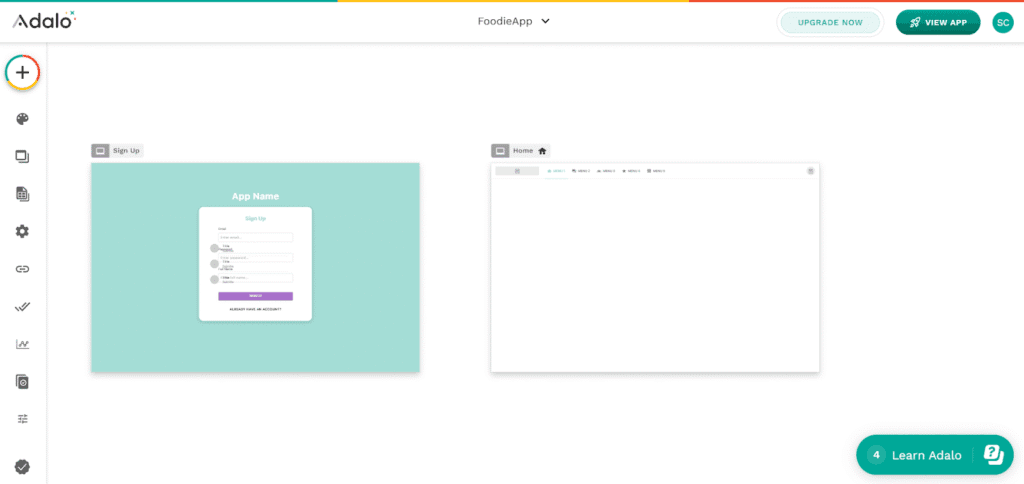
Key Features
- Visual Editor: Drag and drop components to build app layouts.
- Database Integration: Create and manage your app’s data easily.
- Custom Workflows: Build actions and logic through visual tools.
- Payments & Notifications: Supports in-app purchases and push notifications.
Pros
- Powerful & Flexible: Great for detailed app functionality without code.
- Good for Startups: Helps launch serious apps quickly.
Cons
- Steeper Learning Curve: Takes time to master workflows and database setup.
- Performance Limits: Some apps can feel slow on older devices.
10. AppSheet (Google)
AppSheet is Google’s no-code platform for building custom apps that are tailored to your business needs. It works with your existing data in sheets and databases, and turns them into apps that automate workflows, track projects, or manage operations. It’s ideal for companies that want to empower their teams in order to build tools without relying on developers. Thanks to Google’s backing, it integrates well with Google Workspace and other cloud services as well.
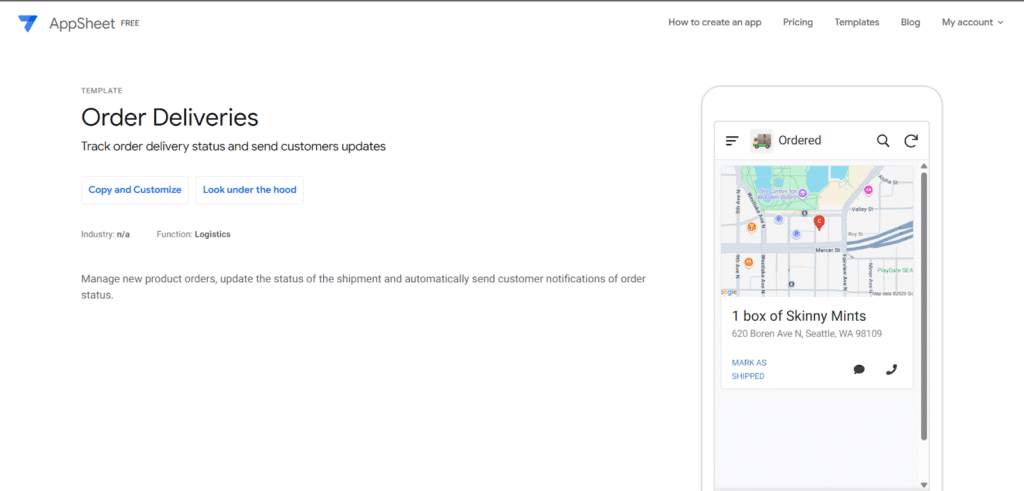
Key Features
- Data-Driven Apps: Builds apps directly from spreadsheets and databases.
- Workflow Automation: Automate business processes with no code.
- Multi-Platform: Apps work on mobile and desktop both, seamlessly.
- Security & Access Controls: Lets you manage who can use and edit apps.
- Integration with Google Services: Connects easily with Google Workspace tools.
Pros
- Powerful for Business Use: Perfect for custom tools and automations.
- Strong Data Integration: Works well with spreadsheets and cloud databases.
- Trusted & Supported: Backed by Google with great reliability.
Cons
- Business Focused: Less suited for consumer-facing apps or complex UI.
- Requires Existing Data: Most useful if you already have structured data to work with.
Benefits of Using AI App Builders
- Faster Development: AI app builders speed up the process. This lets you create and launch apps much quicker than traditional coding.
- No Coding Required: You don’t have to be a developer, as these tools make it possible for anyone to build apps using visual interfaces and simple instructions.
- Smarter Suggestions: Built-in AI can recommend features, fix code errors, and help you improve your apps as you go, making the process smoother.
- Cost-Effective: By reducing the need for a big development team and cutting down on build time, AI app builders can save you a lot of money.
Conclusion
Choosing the right AI app builder can make a huge difference in how quickly and confidently you bring your ideas to life.
With options for every skill level and project type, these platforms put powerful tools in your hands, whether you’re building something simple or just aiming for a feature-packed app.
As AI keeps reshaping the app-building landscape, it’s easier than ever to create, experiment, and launch without getting tangled up in any technical hurdles.
The world of app creation is open to more people than ever before, and with the right AI app builder, you’re only a few steps away from building something truly great.
Check out our other blogs for more AI tools and insights
FAQs
While AI app builders simplify development with templates and visual tools, many also offer deeper customization through workflows, scripting options, or plugin ecosystems. This allows users to customize their apps beyond basic layouts, adding unique features and logic that fit specific needs without starting from scratch.
AI app builders have come a long way and can create powerful, scalable apps suitable for many businesses and projects. However, for highly complex or performance-critical applications, traditional coding might still be necessary. AI builders are best seen as tools that complement coding, speeding up development and lowering barriers rather than fully replacing developers.
Some common challenges include limited control over app performance, occasional difficulties handling very complex business logic, platform dependency, and potential vendor lock-in. It’s important to evaluate your project’s requirements thoroughly and choose tools that align with both current and future needs.
Most modern AI app builders support easy integration with popular tools via APIs, webhooks, and built-in connectors. This enables syncing data with CRMs, payment gateways, marketing platforms, and more, ensuring your app can fit seamlessly into your existing tech ecosystem without heavy custom development.

